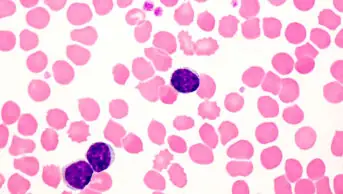Bruton tyrosine kinase (BTK) inhibitors are used to treat cancers caused by defective B cells, such as chronic lymphocytic leukaemia, B-cell lymphomas and Waldenström macroglobulinemia (WM). While B-cell malignancies are relatively rare cancers, their incidence is increasing. There are significant side effects and drug interactions associated with these therapies, and as the clinical use of BTK inhibitors increases, so does the need for pharmacists and pharmacy teams to be aware of them.
In this episode of The PJ Pod, Caitlin Killen, assistant clinical editor, speaks to a patient who has received these therapies, as well as with two experts to find out more about the different BTK inhibitor classes, their mechanisms of action and considerations for their use in practice, with a focus on WM.
Many thanks to expert patient Harriet Scorer; Shirley D’Sa, consultant haematologist and clinical lead for the University College London Hospitals Centre for WM; and Jaimal Kothari, a consultant haematologist based in Oxford, for their expertise.
This episode was produced by Geoff Marsh.
Want to hear more from The PJ Pod? Follow us on Spotify, Google Podcasts, Apple Podcasts or other popular podcast platforms to listen to our latest episodes.

Cancer learning ‘hub’
Pharmacists are playing an increasingly important role in supporting patients with cancer, working within multidisciplinary teams and improving outcomes.
However, in a rapidly evolving field with numbers of new cancer medicines is increasing and the potential for adverse effects, it is now more important than ever for pharmacists to have a solid understanding of the principles of cancer biology, its diagnosis and approaches to treatment and prevention.
This new collection of cancer content, brought to you in partnership with BeOne Medicines, provides access to educational resources that support professional development for improved patient
Related links
- WM UK — the only charity in the UK focused solely on Waldenstrom’s macroglobulinaemia
- MYD88 L265P somatic mutation in Waldenström’s macroglobulinemia
- Ibrutinib in previously treated Waldenström’s macroglobulinemia
- A randomized phase 3 trial of zanubrutinib vs ibrutinib in symptomatic Waldenström macroglobulinemia: the ASPEN study
Disclosures and conflicts of interest
Harriet Scorer is a trustee of WM UK.
Shirley D’Sa is on advisory boards for Janssen, BeiGene and Sanofi. She has received speaker’s fees from BeiGene and Janssen, and research funding from BeiGene.
Jaimal Kothari is on the advisory board for BeiGene. He has received honoraria from BeiGene, Takeda and Janssen, and research funding from MSD.


